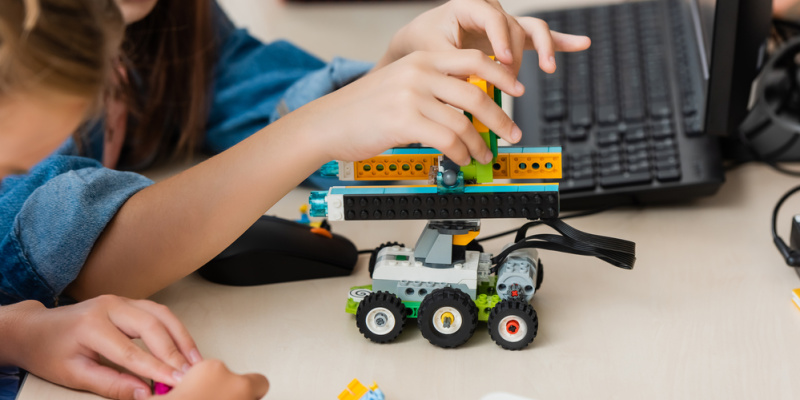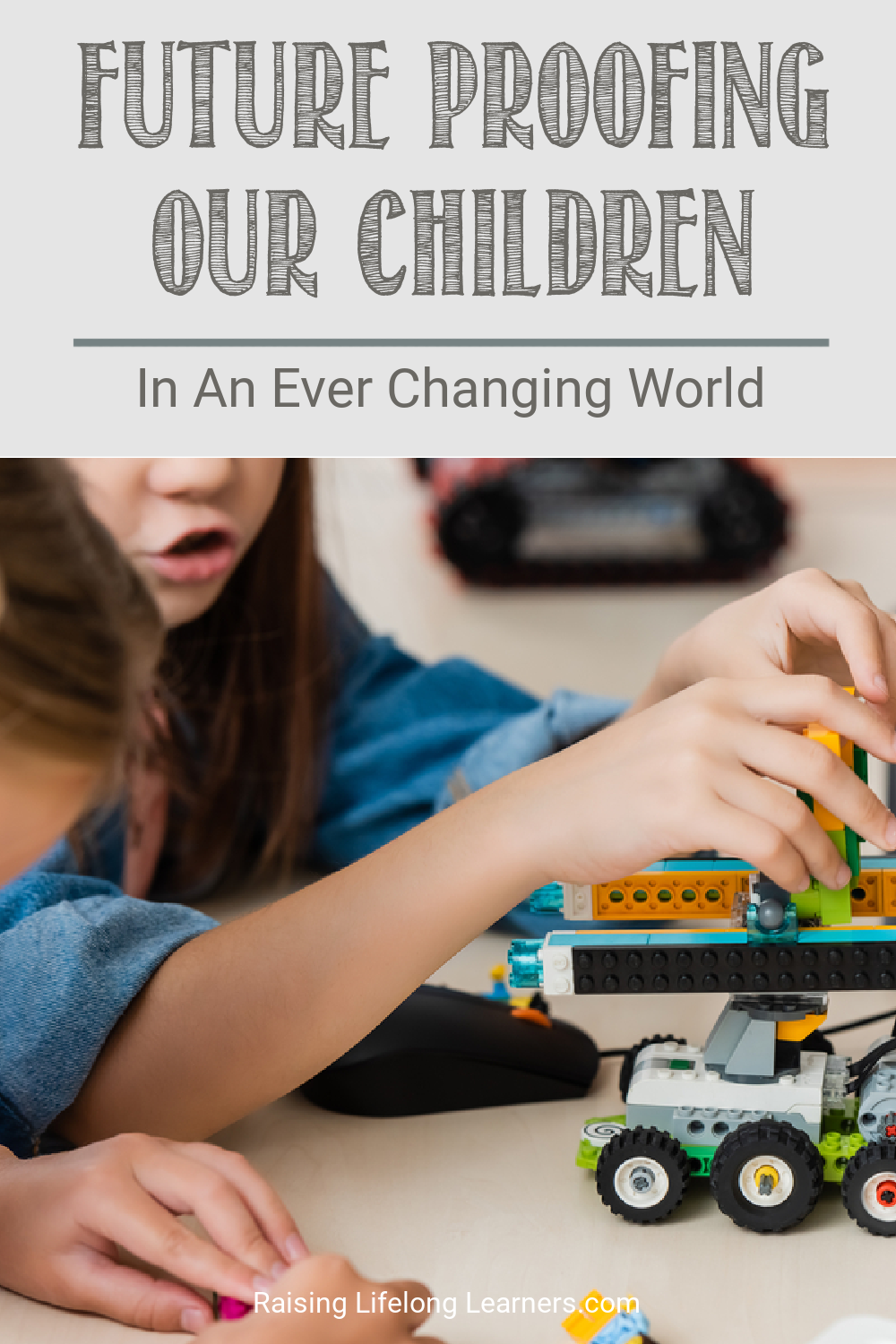Future Proofing Our Kids In An Ever Changing World
This new series is all about equipping our kids for the future with a sense of wonder, adventure, joy and encouragement. Today’s topic is an introduction, all about “future proofing” our kids in an ever changing world. Throughout the course of this series, we’ll discuss child led learning and interest driven choices that we can make in our homeschool, to help prepare our children for the future.
What Do I Mean By “Future Proofing”?
What does it mean when I say future-proofing our kids and their education?
Future-proofing typically means to design software, computers, and other kinds of technological devices so that it can be used in the future, even when the technology changes. Future-proofing in a very real sense, is all about creating the new things you’re creating right now so that they last, because our world is so quickly evolving,
Technologies change, politics change, access to materials changes – just take a look at the last two years alone. The world is a different place and continues to evolve. When comes to education, we want to consider this as well.
We want to plan to future proof our kids for whatever comes.
I liken it back to my own world right now. My job is super cool. I have this amazing opportunity to speak to homeschooling families around the world, virtually through online forums, summits, meetings, memberships, and conferences. Then also in person, when I’m consulting, one-on-one working with coaching clients, working with small groups or in person at conventions, conferences, or retreats. I also write. I write books for teachers, parents, and kids. I write articles. I’m working on a column with Homeschooling Today Magazine. I create programs and I podcast.
I do all sorts of things that tap into my background with my education and my degrees. That being said, this is not a job I could have prepared for when I was in college.
Back then, podcasts and zoom, didn’t exist! I didn’t know anything about getting a good mic, about using software to edit audio files, to stitch those audio files together, to blend music, to create an intro, or even ads.
I wasn’t speaking at giant conventions with thousands of people in a room or jumping online to video conference with a mom in need of help. These are all things I didn’t know existed and wasn’t actively preparing for in my education.
The same is true for our children. We don’t know what opportunities are going to be out there for our kids, because things change so quickly (they change even more quickly they did when I was a kid).
Going To Work To Play Every Day
This video from Boston dynamics shows robots dancing to the song, Do you love me?
It’s fascinating. It’s funny. It’s quirky. It’s cool.
Moreover, it really encapsulates what I want you to think of when you consider education and future. An engineer who programmed one of the robots in the video said in an interview that it was so fun playing with the ideas to create this group of robots dancing because it made her think creatively. The robot that she was programming was not a human shaped robot. It didn’t have joints that moved in the same way as our knees, our elbows, our arms, our shoulders, and our hips do it.
With the robot, in some cases its joints were backwards compared to humans. In others, they were just completely different.
When asked about her approach to solving this problem, she said she just played. She would test something, create a program, throw it into the software and let the robot go do what she’d programmed. Then, she’d assess what worked and what didn’t.
Then, it was back to the drawing board and try again. She said it was like going to work to play every day.
Her statement really stuck with me because that’s the best thing about education. It’s the best thing about what we get to do as we homeschool our gifted and twice exceptional children.
We can cultivate the same kind of learning environment in our homes.
Learning Is A Journey, Not A Destination
We help future proof our children by focusing less on what we’re teaching them and focusing more on the ways we’re teaching them to learn for themselves.
Let’s talk about what this looks like in a practical sense, because we still have state standards to check off, portfolios to show at the end of the season to an assessor, or standardized tests to take.
How does this translate to homeschooling our quirky kids and still meeting the requirements? First, there are lots of ways to meet an end goal that don’t always look like what we’ve been told.
Let’s back up for a second and think about all the different ways that we can homeschool.
We can pick a curriculum off of a shelf that is grade leveled for us and has benchmarks in it that tell us what we need to teach when we need to teach it. It will have a teacher’s guide, workbooks and prompts. There’s nothing wrong with these all-in-one curriculums. I’ve used some myself over the years. But if you’re homeschooling a quirky kid, especially if those quirks lend themselves to a potential gifted diagnosis or identification, the chances of you finding a boxed curriculum that meets the needs of your child across the board are pretty much slim to none.
One of the hallmark characteristics of our gifted children is that they are asynchronous. They develop asynchronously, meaning they are seemingly many ages at once. They can be far ahead, socially and emotionally, right on target in certain academic levels or subjects while behind in others. They can have behavioral challenges that make it very difficult to sit still, to focus on a workbook or a leveled curriculum.
You might find, perhaps, a math curriculum that works really well, but nothing else within that boxed curriculum that works for your child.
Your child could be at a fifth grade level in math, an eighth grade level in science, beyond college level in writing, and then a first or second grade level in reading. You can’t just take the whole boxed curriculum for third grade.
When you have quirky kids, you can also homeschool in a variety of ways. There’s unschooling. There’s the Charlotte Mason method. There’s the classical method. There are some co-ops and programs like classical conversations. There are cottage schools, hybrid schools. There are online programs. There are so many homeschool programs, methods, and methodologies.
Your curriculum or method of homeschool matters less when it comes to the future. What makes the greatest impact is becoming a student of your child, knowing what makes your individual kid tick, and what works best for your family and rolling with it. The very best thing we can do to future proof our kids is to know them well.
Raising Lifelong Learners Podcast #150: Future Proofing Our Kids In An Ever Changing World
This new series is all about equipping our kids for the future with a sense of wonder, adventure, joy and encouragement. Today’s topic is an introduction to this series, all about “future proofing” our kids in an ever changing world.
Links And Resources From Today’s Show:
- SPONSOR: Synthesis
- SPONSOR: The Learners Lab
- The Best Advice I Can Give You: Become A Student Of Your Child
- Meeting the Asynchronous Needs of Your Gifted Child
- When Your Child Seems “Many ages at once” | Living with and Teaching Asynchronous Kiddos
- Interest-Led Homeschooling and Your Gifted Child
- Homeschool Curriculum for Your Asynchronous Gifted Learner
- The Ultimate Guide to Homeschooling Gifted Children
Leave a Rating or Review
Doing so helps me get the word out about the podcast. iTunes bases their search results on positive ratings, so it really does help — and it’s easy!
-
- Click THIS link to go to the podcast main page.
- Click on View in iTunes under the podcast cover artwork.
- Once your iTunes has launched and you are on the podcast page, click on Ratings and Review under the podcast name. There you can leave either or both! Thanks so much.
Want to record your own question, comment, or have your kids tell us what they LOVE to learn about? Click below and start recording!














